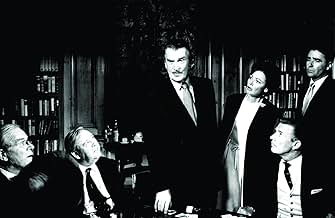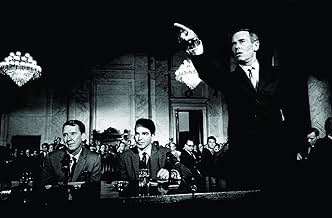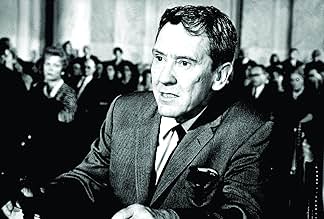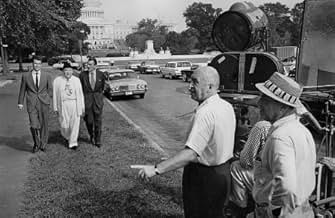Als der US-Senat einen für den Posten des Außenministers vorgeschlagenen Kandidaten überprüft, kommt ein Geheimnis aus der Vergangenheit ans Licht, das nicht nur den Kandidaten, sondern auch... Alles lesenAls der US-Senat einen für den Posten des Außenministers vorgeschlagenen Kandidaten überprüft, kommt ein Geheimnis aus der Vergangenheit ans Licht, das nicht nur den Kandidaten, sondern auch den Ruf des Präsidenten ruinieren kann.Als der US-Senat einen für den Posten des Außenministers vorgeschlagenen Kandidaten überprüft, kommt ein Geheimnis aus der Vergangenheit ans Licht, das nicht nur den Kandidaten, sondern auch den Ruf des Präsidenten ruinieren kann.
- Nominiert für 1 BAFTA Award
- 1 Gewinn & 2 Nominierungen insgesamt
Empfohlene Bewertungen
The premise, the nomination of a controversial new Secretary of State, and the actions of the President and Congress to help or hinder his approval, is still a remarkably timely issue, over forty years later, and it is surprising how little things have actually changed. With Henry Fonda as the nominee, you'd expect that he'd be the 'good guy' of the tale, but when he lies under oath (even for the best of reasons), Preminger makes it clear that in politics, as in life, there is little that can easily be divided into 'black' and 'white'.
Certainly, there are recognizable historic figures in the cast, under different names. The most obvious is skirt-chasing Sen. Lafe Smith, a thinly-disguised JFK, himself, who cut quite a social path prior to marrying Jackie (and afterward, too, as the years have revealed). That his real-life brother-in-law, Peter Lawford, plays the role, is a grand piece of 'tongue-in-cheek' casting (as is Gene Tierney, one of Kennedy's early 'conquests', as a Washington social maven). One character has become even more fascinating, since the film's release; wily South Carolina Sen. Seabright Cooley (a brilliant Charles Laughton, in his final role), was said to have been based on Illinois' legendary Everett Dirksen, but in a real-life parallel, South Carolina produced a 'real' Sea Cooley, in the amazing Strom Thurmond! The 'Who-Is-Who?' aspect aside, the film is populated with many fascinating characters, from wise and sympathetic Senate Majority Leader Robert Munson (Walter Pigeon, in one of his finest later roles), and his 'right-hand man', Senate Majority Whip Stanley Danta (Paul Ford, also wonderful), to the Minority opposition, headed by the perfectly-cast Will Geer. Women, who were finally achieving greater political status, aren't as well-conceived in the film, but are present, with Betty White(!) in a small but visible role.
The key 'players' of the drama, however, are the wily, dying President (screen veteran Franchot Tone, in a terrific 'comeback' role), the enigmatic Vice President (Lew Ayres, another screen legend making a 'comeback'), young, idealistic Sen. Brigham Anderson (Don Murray, who nearly steals the film in his tragic portrayal), and opportunistic Sen. Fred Van Ackerman (George Grizzard, as easily the film's most hiss-able villain!) As with all Preminger films, there is an element of controversy in the story, with homosexuality as the issue addressed. While later film historians have complained that the director fell back into an almost caricatured approach to the gay lifestyle, considering the era the film was produced, and the censorship restrictions of the time, to even mention it was a courageous move, and that Preminger kept this key plot element in the story should be applauded.
"Advise and Consent" may not be the kind of film that will appeal to everyone, but each time I hear Jerry Fielding's stirring opening theme, I find myself drawn back into this ever-fascinating world of Politics and Power, and I think, if you give it a chance, you'll be hooked by it, too! This one is a keeper!
A moving look at a fictional moment in American politics. We see the dirty deals behind the scenes, but also that dignity and wisdom is preserved by some of the men (and one woman, shown). And we see the power of the system, the value of begrudging respect for those with opposite views, and plain old simplicity of being on the Senate floor and making points, orally, in front of a bunch of others, some of them actually listening.
Reminds me of my classrooms, and that brings government down to a level of believability. That's the secret to the movie, overall, it's ability to make the people real, including a host of really great actors like Charles Laughton and Walter Pidgeon, and of course Henry Fonda, who has a smaller role. Franchot Tone makes a believable ailing president, and it's great to see Gene Tierney in 1962, perfectly cast as a cool, smiley Senator's wife.
Otto Preminger is one of those revered directors who was always tweaking the moral edges of Hollywood, and therefore of America, and the spectacular thread that rises as the movie goes along, of a homosexual subculture existing at all in 1962, and arising from the activity of soldiers, and penetrating the Senate directly, was weirdly controversial stuff. Of course, it's almost ridiculous now, but it wasn't then, and to hear the central senator refer to another senator's gay military experience as a "tired old sin" is hard stuff for those of use who have grown up thinking "each to their own," or even "don't ask don't tell."
Preminger also irked a few anti-Communists by using a couple of left-wing actors, including Burgess Meredith, who has a small but memorable role. And the whole notion of a potential Secretary of State once having been superficially involved in a "Communist cell block" is interesting here partly because it shows how silly accusations can be, attacking things you do when you're twenty and have fully rejected or outgrown. Fonda is that figure of utter respectability for the good reason that he represents utter morality and patriotism, without become a cardboard flag-waver.
Though released to a public well into the Kennedy era, it feels like an Eisenhower world, with a couple younger senators easily looking like the Kennedy type, but still not President. The belligerent Old South conservative is, tellingly, a Democrat, back in the days when the South was pretty much conservative democratic. There are no parties mentioned, actually, but the leading voices seem to be liberal in their foreign policy, more like the Kennedy tone (or from the 50s, the tone of Adlai Stevenson, who lost the nomination bid to Kennedy in 1960). The book that led to the movie, by Allen Drury, was finished in 1959, and Drury was a bit of a right-winger, critical of the media he was part of, and openly anti-Communist. The events in the story (book and movie both) take one notable liberty: the Senator with a "homosexual scandal" in his past was Lester Hunt of Wyoming, whose son was a homosexual. That was enough to make the father a blackmail target, leading to Hunt's suicide.
That none of this matters is tribute to the movie, which really captures 1950s style American politics in a bright, Hollywood way. I mean that positively. It's not a gritty documentary, and it doesn't make scandal out of everything. But the air is familiar, the tone, the looks, the clothes. And it is supremely well done, from the dignified camera-work (nothing film noir here) to the solid editing and storytelling, to of course the acting itself. Not exciting, but very involving and interesting.
Advise & Consent is a real ensemble piece. There are times when we will follow one character for a few minutes to see the part they would play in this vote, but it never locks in on one person long enough to have a true protagonist. This added to the element of surprise, making it even harder to predict which way the story might go. There were a number of powerful scenes that I loved, and those made up for some of the slower scenes where it felt like we were getting stuck in the tedium of Senate procedures. I did find that the end of the film was a bit too convenient, which made it seem contrived. It's certainly the appropriate Hollywood ending, but in real life it is rare that things would time out as perfectly as we see here. That being said, the story of Advise & Consent is still a good one, and this film feels entertaining and maybe just a little educational at the same time.
Gripping and long movie that contains over-the-top performances, engrossing drama , intrigue , corruption , political events and a special vision of US Senate and its behind-the-scenes Washington . Thought-provoking and stimulating film in which abounds top-drawer acting among the popular stars ; interesting screenplay from Allen Drury bestselling novel wheeling with a suspenseful intrigue about a controversial senator promoted to Secretary of State . When Allen Drury was writing the novel , John F. Kennedy, upon whom the character Senator Lafe Smith was based, was a young Senator with ambitions to be President. When the movie came out Kennedy was President, and Lafe Smith was played by Peter Lawford who was, at that time, married to Kennedy's sister Patricia . Main and support cast are very fine , there abounds magnificent performances as Don Murray , Paul Ford , Walter Pidgeon , Peter Lawford , Gene Tierney , Edward Andrews , Malcolm Atterbury and Franchot Tone , among others . Fascinating interpretation by Charles Laughton at his final movie , easily the most stimulating acting . Furthermore , stands out Henry Fonda who gives an adequate underplaying and the scene-stealing best , George Grizzard . Good production design by Lyle Wheeler , for the scenes taking place inside the US Senate, Columbia dusted off its senate set built for Mr Smith Goes to Washington. Appropriate cinematography in Panavision by Sam Leavitt , though also there is a horrible version being shown in computer-colored . Atmospheric and appropriate musical score by Jerry Fielding .
This engrossing , riveting picture was effective and compellingly directed by Otto Preminger . At the beginning he became a stage director and subsequently a notorious secondary actor . Otto directed several films , nowadays many of them are considered as classic movies . He made ¨Laura¨ that was released in 1944 and Preminger ranked as one of the top directors in the world . He realized all kind of genres as Court drama such as the great success ¨Anatomy of a murder¨, ¨Court martial of Billy Mitchell¨ , Noir film as ¨Laura¨ which made him an A-list director in Hollwyood , ¨Angel Face¨ , ¨Man with a golden arm¨, Religious drama as ¨The Cardinal¨ , Musical as ¨Porgy and Bess¨, ¨Carmen Jones¨ , Western as ¨River with no return¨ and historical as ¨Saint Joan¨, ¨Exodus¨ though also had some flop as ¨Rosebud¨ getting scathing reviews , though with ¨The human factor¨ won him respectful notices . However , his powers began to wane after and by the end of the decade of the 60s he was considered washed-up . ¨Advise and Consent¨ resulted to be one of the his best films . Rating : Better than average , Worthwhile watching .
It was also a book that Hollywood could not film under the film industry's notorious Production Code. As it happened, the book fell into the hands of director Otto Preminger, long-time foe of Hollywood's rules for self-censorship. He not only made the film, he flagrantly broke the code; as such, ADVISE AND CONSENT presents our nation's leaders embroiled in a blackmail plot, finds actress Gene Tierney using the word 'bitch,' and became the first Hollywood film to show a gay bar. It was shocking stuff for 1962.
The story is extremely convoluted. An aging and extremely ill President makes a highly controversial nomination for Secretary of State---which is opposed by a member of his own party, who bears the nominee a personal grudge and who attempts to derail the nomination by accusing the nominee of former membership in the Communist Party. This in turn touches off a vicious battle between those in the party who support the nominee and those who don't, a battle that will ultimately result in the suicide of the only character who has the integrity we would like to see in our political leaders.
The cast is indeed remarkable and, from Lew Ayres to Betty White, plays with considerable conviction and tremendous restraint. Henry Fonda is often cited as the star of the film, but in truth he appears in the small but pivotal role of Robert Leffingwell, nominee for Secretary of State. Screen time is divided between Walter Pigeon as the Majority Leader, Charles Laughton as the senator who opposes the nomination, and Don Murray, an idealist who finds himself chairing the nomination committee. All three play extremely well, but it is really Laughton---in his final screen role---who walks off with the film as the devious and openly vicious Senator from South Carolina. The trio is ably supported by a dream cast that includes Franchot Tone as the President, Lew Ayres as the Vice President, George Grizzard as a growling ideologue, Gene Tierney as a society hostess---and yes, Betty White, who offers a brief turn as the Senator from Kansas.
It has become fashionable to dismiss Otto Preminger films of the 1950s and 1960s as ponderous, all-star, and pseudo-intellectual trash, and indeed it is difficult to find much positive to say about films like EXODUS and HURRY SUNDOWN these days. But Preminger is in many ways under-rated; his films have not always dated well in terms of subject, but they hold up extremely well in the way in which they are put together, with ADVISE AND CONSENT a case in point---and it is worth pointing out that accusations of leftism, adultery, and homosexuality are still enough to prompt everything from impeachment to congressional hearings to resignations. Nor has the process of the political dance itself changed greatly between then and now.
The great flaw of the film is its conclusion, which seems facile to the point of being hokey---but this is also the great flaw of the novel, which ends in much the same way--and at times ADVISE AND CONSENT seems more than a little dry. All the same, it remains a movie worth watching, particularly notable for its performances, fluid camera work, and meticulous recreation of party politics. The DVD offers a near-pristine widescreen transfer with good sound quality and an interesting, if occasionally too academic, commentary by film historian Drew Casper. Recommended.
GFT, Amazon Reviewer
Wusstest du schon
- WissenswertesDirector Otto Preminger offered the role of a Southern senator to Martin Luther King Jr., believing that the casting could have a positive impact (despite the fact that there were no black senators at the time). King declined after serious consideration, as he felt playing the role could cause hostility and hurt the civil rights movement.
- PatzerWhen the roll call vote is being conducted on the motion to advise and consent to Leffingwell's nomination, Senator Van Ackerman's name is not called. Even though he had left the Senate Chamber, the clerk would still have called his name.
- Zitate
Johnny Leffingwell: The phone - Senator Munson.
Robert Leffingwell: Tell him I've gone out.
Johnny Leffingwell: Why?
Robert Leffingwell: Because, Johnny, he'll want to do some things that might obligate me.
Johnny Leffingwell: I mean why do you want me to lie? If you're in, you're in; if you're out, you're out.
Robert Leffingwell: Son, this is a Washington, D.C. kind of lie. It's when the other person knows you're lying, and also knows you *know* he knows. You follow?
- Alternative VersionenAlso available in a computer colorized version.
- VerbindungenFeatured in Henry Fonda: The Man and His Movies (1982)
- SoundtracksThe Song from Advise and Consent
Music by Jerry Fielding
Lyrics by Ned Washington
Sung Frank Sinatra - voice on juke box
Top-Auswahl
Details
- Erscheinungsdatum
- Herkunftsland
- Offizieller Standort
- Sprache
- Auch bekannt als
- Advise & Consent
- Drehorte
- Columbia/Sunset Gower Studios - 1438 N. Gower Street, Hollywood, Los Angeles, Kalifornien, USA(Studio, Senate Chamber - interiors)
- Produktionsfirmen
- Weitere beteiligte Unternehmen bei IMDbPro anzeigen
- Laufzeit
- 2 Std. 19 Min.(139 min)
- Farbe
- Seitenverhältnis
- 2.35 : 1


























